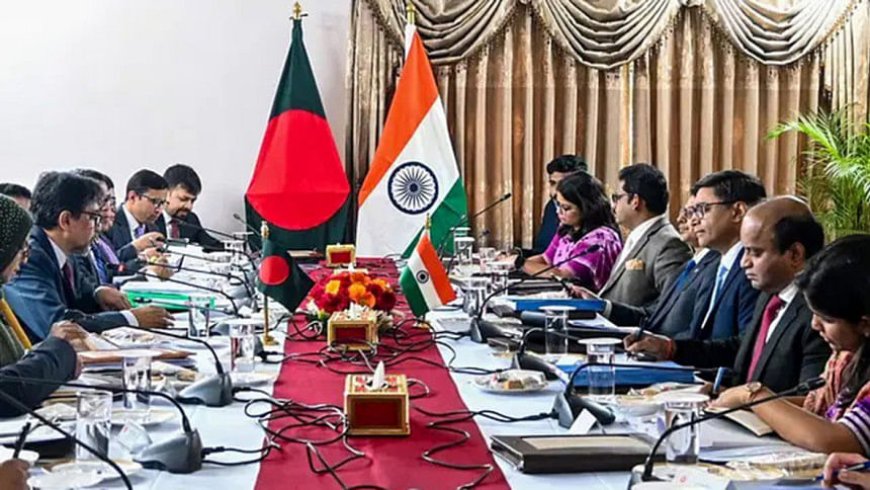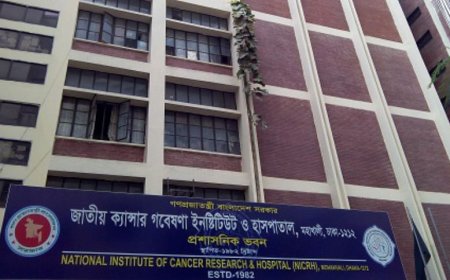Dhaka and Delhi Keen to Strengthen Bilateral Relations
Dhaka and New Delhi are committed to enhancing their bilateral relationship for mutual benefit during the first high-level official talks following Bangladesh's political transition.

In a meeting with visiting Indian Foreign Secretary Vikram Misri yesterday, Chief Adviser Prof. Muhammad Yunus discussed the role of students, workers, and citizens in the July-August uprising, which led to the downfall of Sheikh Hasina’s regime. The Chief Adviser’s press office reported that Yunus emphasized the need to uphold the dreams of those who participated in the movement, stating, “It is a new Bangladesh,” and briefly outlined the reforms introduced by the interim government when Misri visited him at the state guesthouse, Jamuna.
Prof. Yunus described Bangladesh-India relations as “very solid” and “close” while requesting India’s assistance in clearing the “clouds” that have recently affected the relationship. Misri mentioned that Indian Prime Minister Narendra Modi was one of the first foreign leaders to congratulate Prof. Yunus after he assumed office, adding, “We wish you every success.” He also expressed India’s commitment to continuing the relationship with Bangladesh, saying, “We want to carry on from where we left off.”
India’s Ministry of External Affairs further stated that Misri reiterated New Delhi’s desire to enhance engagement with Bangladesh’s interim government and work together to strengthen bilateral ties. “There is no second thought about increasing engagements. We see this as beneficial for both countries,” Misri said.
Syeda Rizwana Hasan, the environment, forest, and climate change adviser, spoke to the media after the meeting, highlighting both sides' eagerness to strengthen bilateral relations. She also mentioned that India had closely monitored the events of July and August and expressed awareness of the situation.
Misri arrived in Dhaka yesterday morning to attend the annual Foreign Office Consultation (FOC) with Bangladesh’s Foreign Secretary Md Jashim Uddin. Officials from various ministries, including water resources, commerce, and home affairs from both countries, participated in the discussions.
After the FOC, Misri met with Foreign Adviser Touhid Hossain and then with Prof. Yunus. Misri emphasized India’s goal of fostering people-centric relations with Bangladesh, which is evident in the development projects supported by India and engagements in trade, connectivity, energy, and cultural cooperation. “There is no reason why this mutually beneficial relationship should not continue to develop in the interest of our people,” he stated.
The visit occurred amid tensions following the fall of Hasina’s government and her flight to India. The arrest of Hindu priest Chinmoy Krishna Das Brahmachari in late November sparked protests in India, and an attack on the Bangladesh Assistant High Commission in Agartala led to demonstrations in Bangladesh.
The Chief Adviser assured that the interim government is committed to safeguarding the rights of every citizen, irrespective of creed, ethnicity, or gender, and stressed unity. Misri raised concerns about the safety and welfare of minorities in Bangladesh, addressing some "regrettable" incidents of attacks on cultural, religious, and diplomatic properties.
Bangladesh has criticized the Indian media for spreading propaganda regarding alleged attacks on minorities, with Rizwana stating, “We raised concerns about ongoing misinformation campaigns aimed at damaging Bangladesh's reputation as a nation of harmony.”
Foreign Secretary Jashim Uddin also requested India take action against false media reports about Bangladesh, stating, “We emphasized that people of all religions in Bangladesh can freely exercise their faith.” He emphasized that the issue was internal and should not be interfered with by any other country.
Regarding the presence of Sheikh Hasina in India, Prof. Yunus raised concerns about her statements, which he said were creating tension. Misri responded that India’s relations were not tied to any particular party in Bangladesh and that India would engage with the government in power.
In terms of other issues, Bangladesh and India discussed border killings, water sharing, visa services, and cooperation in various fields. Bangladesh called for an end to border killings and sought India’s cooperation on issues like flood forecasting, water data sharing, and hydropower imports from Nepal via India.
Misri noted that India had recently doubled the number of visas issued to Bangladeshis and planned to increase this number further. Bangladesh also urged India to remove tariffs and para-tariffs on bilateral trade and ensure the uninterrupted supply of commodities.
On the issue of Rohingya repatriation, Bangladesh sought India’s support for a sustainable solution, emphasizing that it is crucial for regional peace and stability.
Prof. Yunus also called for closer cooperation in flood and water management and urged India to join his initiative to revive SAARC, saying, “We want to build a prosperous new future for all of us.” Misri acknowledged India’s ongoing engagement with SAARC, but noted that there are some obstacles to its progress.
What's Your Reaction?





















































































